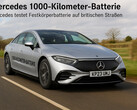When Mercedes-Benz put a solid-state battery in a modified EQS sedan, the company claimed the car would travel more than 620 miles on a single charge. That turned out to be a conservative estimate as the EV drove 750 miles (during a recent real-world testing, without depleting the battery.
The solid-state battery cells were supplied by American startup Factorial Energy, which is collaborating with the automaker. The test drive spanned multiple countries, starting in Stuttgart, Germany, and ending in Malmö, Sweden.
The long trip covered as many realistic driving scenarios as possible, including highway speeds, which tend to consume more power. Mercedes said the EQS relied on its proprietary Electric Intelligence navigation system, which aims to improve efficiency based on factors such as topography, traffic, temperature, and cabin energy consumption.
Mercedes reported that the car had 85 miles of driving range left after the journey, implying that the battery could have lasted beyond 800 miles. This is significantly longer than the equivalent gas-powered cars can go on a full tank.
The solid-state battery in the EQB reportedly can pack 25 percent more energy than standard liquid electrolyte solutions of the same weight and size.
Factorial is also working with Hyundai, Stellantis, and other automakers to bring solid-state batteries mainstream. Others, such as Volkswagen, Toyota, BMW, and Nissan, are also in the race to put them in mass-production vehicles.


















